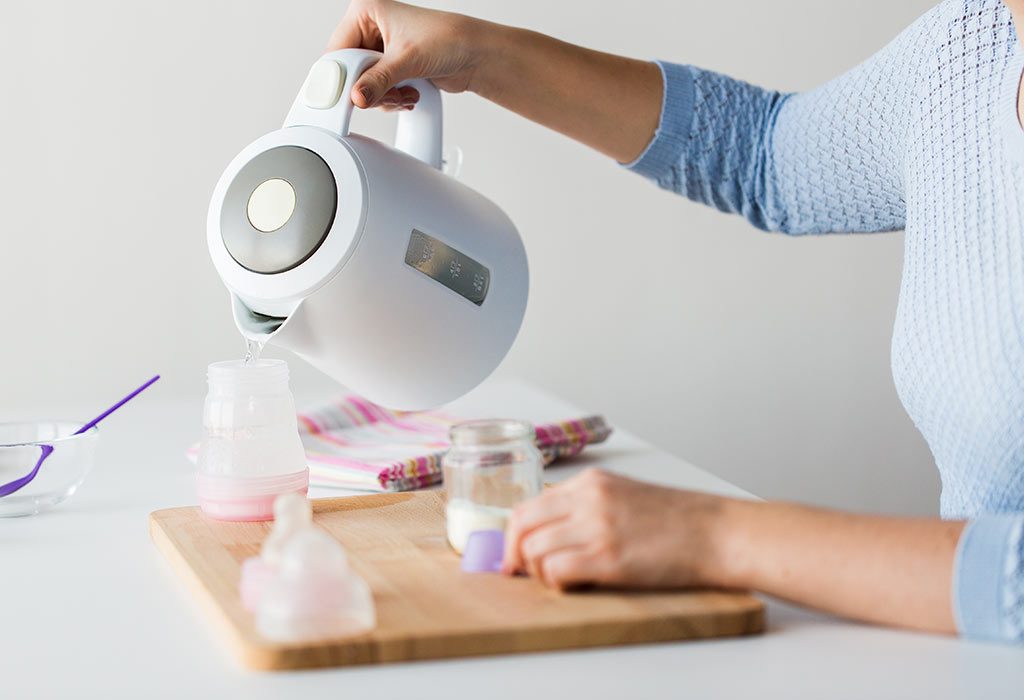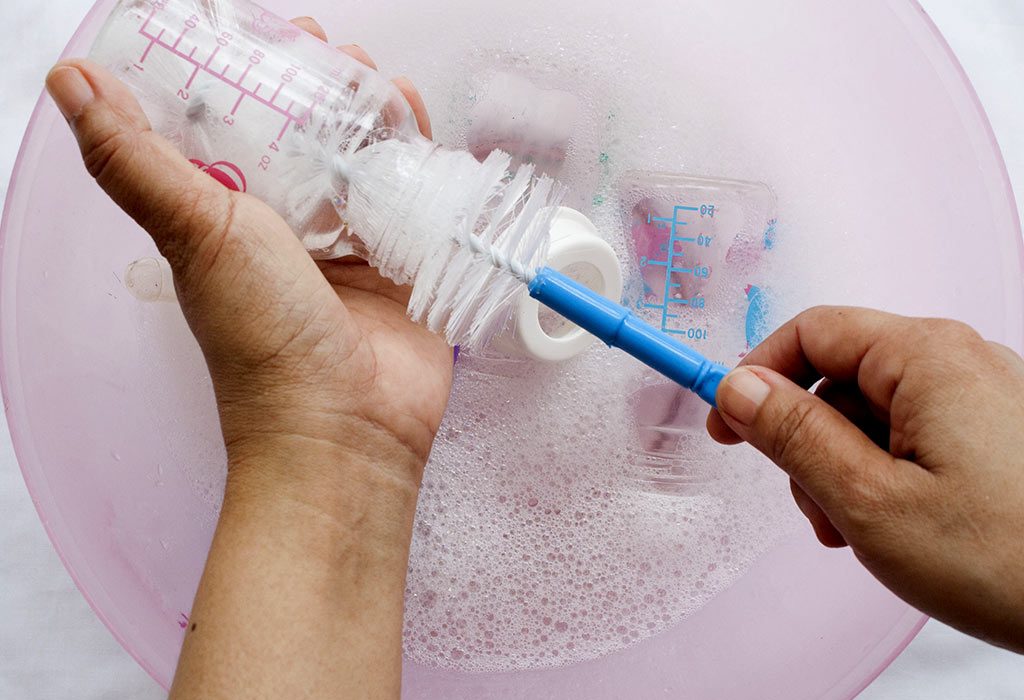In this Article
Medical conditions, environmental circumstances, convenience and choice all play an important role in deciding whether or not you should feed formula milk to your baby. When you decide to give formula milk to your baby, you will have to be careful to avoid contamination and decay. This raises the question of how you should store formula milk so that your baby reaps maximum benefits.
How to Store Formula Milk for Your Baby?
Here’s what you will need to look out for when handling formula milk:
1. Equipment
A good container is of utmost importance to store formula milk. Here is what you should consider when looking for one.
- Do not hesitate to buy baby feeding bottles, nipples, etc. from reputed brands. Bottles and nipples made of cheaper plastics could leak hazardous chemicals into the food, and cheap glass could shatter easily.
- Buy microwave-safe bottles. All feeding equipment will need to be sterilised often. Hence heat resistant is a must!
- Specialised cleaning agents and equipment is best for baby bottles. There are even electric steamers that are designed to make sterilising your baby feeding equipment convenient.
- Buying several bottles, sized for one feed each is the best option.

2. Sterilisation
Sterilisation is the process of getting rid of any microbial life (bacteria and virus) that may be present on the surfaces of the bottle.
- Sterilisation can be done using two basic “agents” – heat and chemicals.
- Always clean your equipment thoroughly with warm water and soap before the sterilisation process itself.
- Both the bottle and the nipple will need to be sterilised as the baby comes in direct contact with these.
- Sterilising with heat can be done by rapid boiling the equipment in water for 5 minutes or with steam. As heat tends to disintegrate plastic, special heat-resistant plastics need to be used to make baby bottles.
- If the baby feeding equipment that you use is not heat resistant, go for chemical sterilising equipment. This method of sterilisation may also serve as a great alternative when travelling away from home.
3. Preparation
Whether you are mixing formula at home or buying it ready-made, utmost care must be taken to keep it sterile and unspoiled. Here is what you need to do:
- First, boil the water and then mix the formula.
- Mix the formula in the boiled water once it has sufficiently cooled. If the water is too cold, the formula will not mix, hence the word “sufficiently”.
- The right temperature for baby milk is “warm” (higher than room temperature), so the baby can be fed as the formula cools down. This way, unnecessary re-heating can be avoided.
- The amount of formula and the amount of water to be mixed will be specified on the pack. This ratio will give a perfect consistency (neither too thick nor runny) for baby milk.
- Mixing should be thorough. No lumps should form. When the formula mixture is poured into the bottle, close its lid and shake well before feeding.
- The longer the formula is kept mixed, the higher the chances that bacteria and other microbes could develop in it. So, it is always best to mix formula when and as required! While travelling, or outside for long periods of time, carry some hot water in a flask to mix the formula with.
- The ready-made formula contains pasteurised milk in it, and hence there is a lower chance of microbes developing in it as opposed to formula mixed at home. Hence, generally, the readymade formula is safer to store for later use.
4. Cleaning
Essentially, what you are fighting against is the build-up of microbes on the baby bottle or other equipment and in the formula. Opinions vary on how often equipment need to be sterilised, some say it should be sterilised before each feed while others suggest sterilising once a week. Here is what you need to know about it:
- Generally, the younger the child, the more often his feeding equipment needs to be sterilised.
- Another factor is the quality of the water supply in your home – the cleaner the water, the lower the need for frequent sterilisation.
- When the formula is in powder form, it lacks the moisture that is necessary for bacteria to thrive. However, once you mix it with water, it becomes an ideal habitat. This is why experts recommend that formula that you have already mixed should not be kept out for more than an hour.
- Wash your feeding equipment in warm water and soap after each use.
- Sterilise equipment prior to use as equipment, though sterilised, will lose sterility on prolonged exposure to air.

5. Storage
Since babies need to be fed round the clock, making fresh formula milk each time can cut into your sleep and affect your mood. Here are some pointers on how to store formula feed for night feeds. Here is what you need to know about storing it.
- Keeping mixed formula outside for more than an hour makes it highly susceptible to bacterial growth. So, don’t use it after an hour.
- If the bottled formula has been in the fridge for more than 24 hours, get rid of it!
- Do not store up leftover formula from a feed.
- The best way to store sterilised bottles is to place them in an airtight container and then refrigerate. This method is the best way to store formula mixture.
6. Re-heating
Are you wondering if you can re-heat the formula milk and give it to the baby? Here is what you need to do.
- To reheat formula from the fridge, heat water in a saucepan and turn the flame off once it is hot. Place the bottle in it and allow it to warm.
- The best temperature for babies to feed is only lukewarm. Formula milk needn’t be re-heated to a boil, like one would do with milk.
- The reheating process should be done in ten minutes or so.
- Do not microwave your refrigerated baby formula as it will be heated up unevenly.
- Electric bottle heaters are a more convenient option but these can be expensive.
How Long Can You Keep the Formula Milk at Room Temperature?
It is recommended to not keep the formula milk at room temperature for more than 15 minutes. Failing this, it is still considered satisfactory to either put it in a refrigerator or consume it within an hour from when it is mixed. Now you might ask yourself, “how long can I keep formula milk in the fridge?” Well, the rule for refrigerated formula milk is to keep it for no longer than 24 hours.
Now you know how to store formula milk, go ahead and use it. However, start with formula milk after consulting a doctor.









